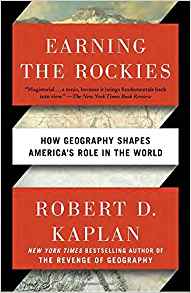 Robert D. Kaplan, Earning the Rockies; How Geography Shapes America's Role in the World (New York: Random House, 2017), 201pp.
Robert D. Kaplan, Earning the Rockies; How Geography Shapes America's Role in the World (New York: Random House, 2017), 201pp.
Robert Kaplan grew up in a small apartment in working class Queens. He still has fond memories of cross country trips with his father when he was a young boy, an inspiration that helped to form his later global wanderlust. For the last thirty years he has crisscrossed the globe as a foreign correspondent.
Many of Kaplan's books have been regional studies, like Balkan Ghosts (1993), Surrender or Starve (2003) about Ethiopia, Soldiers of God (2001) about Afghanistan and Pakistan, or The Ends of the Earth: From Togo to Turkmenistan, from Iran to Cambodia — A Journey to the Frontiers of Anarchy (2001). In The Revenge of Geography (2012), he widened his lens to offer an explanatory thesis for the history of the whole world.
In his newest book, Kaplan returns to his own country, a subject that he addressed in An Empire Wilderness: Travels into America's Future (1999). In 2015, he left his home in Massachusetts and drove cross country to San Diego. He combines first person travel narrative, history, geo-political analysis, and a street-level view of what he sees and hears across America, be it at Lincoln's home in Illinois, a deserted downtown in Wheeling, West Virginia, or the San Diego harbor that is home to our Pacific Fleet that looks east to Asia.
A prominent theme in Kaplan's work is the power of geography to explain history. In his view, the westward expansion of America was in many ways a function of geography — our two oceans, waterways, the remarkably fertile plains, and, of course, the mountains.
It used to be that Kaplan was pegged as a pessimistic analyst of realpolitik, but in the last chapter of this book he tries to thread the needle between political realism and its sense of tragedy, and idealism as seen in American Manifest Destiny (he supported the Iraq War but has since expressed deep remorse for that).
When our westward expansion was completed, and despite our country's faults and failures, he finds that America was "fated to lead" the world as an unrivaled power and necessary protector of the liberal world order. There's a deep moral contradiction here, he observes — if America had not conquered the west, through violence against Native Americans or "a war of naked territorial expansion" like the Mexican War (to take just two examples), there would be nothing like the world order that we enjoy today.


